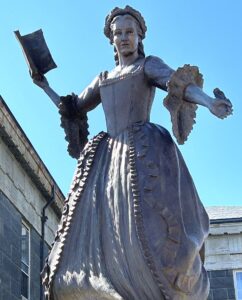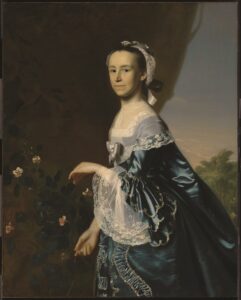Mercy Otis Warren was born in West Barnstable in 1728 to a family of patriots. Their names are perhaps not as familiar today as John Hancock’s and Sam Adams’s. But the Otises and the Warrens made their marks on Cape Cod, in Plymouth and Boston, and on the fledgling nation.
Mercy’s father, James Otis (1702-1778), whose ancestors had settled in Hingham before moving to Barnstable, was a lawyer, wealthy landowner, judge, militia officer, and outspoken critic of British rule. Being passed over for appointment as Chief Justice of the Superior Court of Judicature, the highest court in the colony, for Boston-born Royalist and Lt. Governor Thomas Hutchinson exacerbated a longstanding rivalry between the Hutchinsons and the Otises. Hutchinson would later become governor.

Little is known about Mercy’s mother, Mary Allyne (1702-1774), a Plymouth-born descendant of Mayflower passenger Edward Doty.
Mercy’s older brother was the defiant Revolutionary War lawyer, statesman, and firebrand James Otis Jr. (1725-1783). His eloquent — though, it was said, at times erratic — orations railed against the Empire’s arbitrary power and sweeping warrants that deprived colonists of their rights. The famous slogan “no taxation without representation” is often attributed to Otis. If he didn’t actually coin it, his passionate rhetoric made it a political rallying cry.
Though James was Harvard-educated, his sister, living as she did in a patriarchal society whose women were largely voiceless, was denied formal instruction. Mercy was intellectually curious, and from a young age she sat in on the lessons taught her brothers by their uncle. A voracious reader, she devoured the books in her uncle’s library.
Married in 1754 to merchant, gentleman farmer, and statesman James Warren (1726-1808), Mercy appeared to live a conventional domestic life typical of the time. She raised five sons and managed the family’s Plymouth home. But as the patriot cause took root in the 1760s and the Warrens began hosting prominent participants, the powerful men in her life — her father, brothers, and husband — encouraged her to immerse herself in the revolutionary ideas of the time and to express her opinions.
After her brother suffered a head injury during an altercation with a British official in 1769, his already fragile mental state declined, essentially ending his public career. He retreated to a quiet life in the countryside in Andover, while his sister, always her brother’s confidante, took on his mantle, organizing political meetings and publishing satirical pamphlets and plays that challenged and mocked British authority.
Mercy was one of the first colonial women to enjoy a public audience for her writing, though her early work was published anonymously, perhaps to avoid British retaliation, perhaps to ensure that her words were judged on their merit.

Her persuasive arguments earned her the respect of revolutionary leaders. Her correspondence was prolific, and her associates and friends included John and Abigail Adams, Thomas Jefferson, and George Washington. She came to be known as the “First Lady of the American Revolution.”
After the war for independence, a contentious debate took place when the Constitution was proposed for ratification in 1787. Concerned that the document favored a strong national government over smaller localized government and that it lacked a bill of rights to protect individual liberties, the anti-federalists, Mercy Otis Warren among them, objected.
An anonymously published pamphlet, Observations on the new Constitution, attributed to Elbridge Gerry, a signer of the Declaration of Independence, expressed the anti-federalists’ objections. Only after more than a century, when a descendent, Charles Warren, presented evidence to the Massachusetts Historical Society, was the true authorship of the pamphlet shown to be Mercy Otis Warren.
So it was revealed that it was a woman whose advocacy addressed the deficiencies of the Constitution and helped pen the Bill of Rights — the first ten amendments to America’s new Constitution, which were ratified in 1791.
The culmination of Mercy’s formidable political and intellectual life was the three-volume History of the Rise, Progress, and Termination of the American Revolution, printed in 1805. The sweeping history, written in a personal style, covers the entire Revolutionary period.
Mercy Otis Warren died in 1814 in Plymouth and is buried with her husband on Burial Hill there. Bronze statues of the brother and sister by David Lewis stand on the lawn of the Barnstable County Courthouse in Barnstable Village.
Today, Mercy Otis Warren’s life is commemorated with the Cape Cod Woman of the Year Award for women whose community leadership is trailblazing.
The award is notable for its embrace of patriotism, which, of course, during the Revolutionary War era applied to those who resisted British monarchical control. The original patriots were inspired by ideals of republicanism, which defended not only individual rights but social welfare and the common good. Accordingly, the award honors leadership that transcends self-interest and contributes to a whole community’s success.
Nominations for the Mercy Otis Warren Woman of the Year Award may be made through April 17. Details are on the Barnstable County website: search for Mercy Otis Warren at www.capecod.gov.



